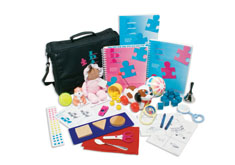IDA™: Infant-Toddler Developmental Assessment –
Complete Kit with Manipulatives and Carrying Case

Features
Ages: Birth to 3-6 years
Time: Varies
Administration: Individual
The Infant-Toddler Developmental Assessment (IDA) is a comprehensive, multidisciplinary, family-centered six-phase process designed to identify children birth to 3 years of age who are developmentally at risk. IDA is an integrated process that includes the Provence Birth-to-Three Developmental Profile. IDA helps determine the need for monitoring, consultation, intervention, or other services for the child and family and may be used to develop an initial Individualized Family Service Plan (IFSP). The assessment process takes into account the complexity and interdependence of health, family, and emotional/social factors that influence a child’s development.
Six Phases
IDA has six phases, the procedures for which are explained described step-by-step. Team discussion follows each phase.
Scoring and Interpretation
Throughout the IDA process, practitioners gather information from multiple sources, integrate that information in a meaningful way, and create a plan of action. Duplication of effort and information is eliminated. This saves time and money, reduces the stress created by more fragmented approaches, and yields more complete information. The IDA process leads to efficient, informed decisions.
IDA meets the assessment criteria required by IDEA, and the IDA process is consistent with the National Task Force on Screening and Assessment of the National Early Childhood Technical Assistance System (NECTAS) guidelines.
Reliability coefficients for the Provence domain scores are generally quite high, ranging from .90 to .96 for ages 1 to 18 months and .78 to .96 for ages 19 to 36 months. Inter-rater reliabilities range from .91 to .95 for seven of the eight domains and .81 for the remaining domain.
COMPLETE IDA KIT (with MANIPULATIVES & CARRYING CASE) INCLUDES:


